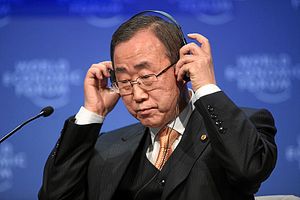Earlier this week, South Korea’s Yonhap news agency reported that Ban Ki-moon, the secretary-general of the United Nations, will visit North Korea, citing a high-level UN source. Early on Wednesday, Ban’s office released an official statement saying no such visit is in the works — at least not for this week. The visit would have marked the first time since that a sitting UN secretary-general has visited North Korea since Boutros Boutros-Ghali’s visit in 1993. Ban, though a South Korean citizen, would be traveling to Pyongyang in his official capacity as the head of the UN, the report noted.
According to Yonhap, Ban was likely to meet with North Korean leader Kim Jong-un. If true, that would have been a significant development. Kim has yet to directly meet with any other head of state, including Xi Jinping of China, North Korea’s traditional partner and benefactor. One source who spoke to Yonhap noted that “There can’t be such a situation where the UN Secretary-General visits North Korea and does not meet with the supreme leader of the UN member state.” It’s unclear if Ban would have been traveling as an invitee of the Kim regime or whether his office arranged for the trip.
Originally, the UN spokesman’s office refused to comment on the trip, but a statement released Wednesday outlined Ban’s schedule through November 30 — which notably does not include any stops in North Korea. “The Secretary-General will not be traveling to the DPRK [North Korea] next week,” the statement said. However, it did not rule out the potential for a future trip: “The Secretary-General has repeatedly said that he is willing to play any constructive role, including traveling to the DPRK, in an effort to work for peace, stability and dialogue on the Korean Peninsula.”
If Ban did travel to North Korea, what would his agenda be? It is likely that Ban would discuss denuclearization of the Korean peninsula as well as North Korea’s troubling human rights record. Both issues regularly feature at the top of the UN agenda. The UN recently opened a field office for monitoring the state of human rights in North Korea in Seoul, pursuant to an investigation last year that detailed a litany of abuses committed by the regime.
Even if Ban did travel in his official capacity, the visit could have important implications for inter-Korean ties. Relations between South Korea and North Korea remain tense since they walked back from mutual brinkmanship in August. The two countries remain officially at war and high-level interactions remain rare. Kim Jong-un, who took over from his father, Kim Jong-il, in 2011, has yet to hold a high-level summit with his counterpart across the 38th parallel, South Korean President Park Geun-hye.
Ban’s presence in Pyongyang would extend beyond his official capacity as the secretary-general of the United Nations. He is a former South Korea foreign minister and, if political rumors in Seoul pan out, likely to return to South Korean politics after completing his term at the United Nations. Bloomberg reported earlier this year that Ban, who is slated to wrap up his time at the UN in just over a year, may seek South Korea’s presidency. Ban has denied any interest in South Korean politics.
In September, opinion polling showed Ban ahead of both the “leaders of South Korea’s ruling and opposition parties,” according to the Korea Herald. If Ban’s does plan a return to politics in South Korea, demonstrating a rapport with North Korea’s leadership may prove valuable.
This piece has been updated to include the UN statement issued Wednesday.
Update: North Korea’s official KCNA news agency reportedly insists that despite denials from the Secretary-General’s office, Ban is still coming to Pyongyang.

































